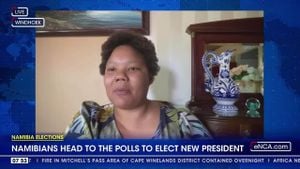A fragile calm hangs over Amsterdam, where the aftermath of violence still reverberates through the streets and the hearts of its residents. Just last week, chaos erupted following the arrival of thousands of Israeli football fans for a Europa League match against Ajax, culminating in violent clashes between these fans and sections of the city's Muslim community. The incidents have drawn severe national and international scrutiny, highlighting underlying tensions within Dutch society and leading to significant political fallout.
City officials, grappling with the aftermath, described the riots as a "toxic combination of antisemitism, hooliganism, and anger stemming from the broader Middle Eastern conflict". This unsettling cocktail has not only strained relations between Amsterdam’s Jewish and Muslim communities but has also shaken the very foundations of Dutch politics.
Initially, this discord visibly escalated as Maccabi Tel Aviv supporters defaced and burned Palestinian flags during their time in the city. Tensions flared, culminating in violent outbursts and hit-and-run attacks targeting both Israeli fans and innocent bystanders. Eyewitnesses reported how groups of rioters engaged aggressively with Israeli supporters, coming at them from all sides, sometimes using vehicles and scooters to facilitate their violent intentions.
Local Rabbi Lody van de Kamp characterized the environment surrounding the match as "a tinderbox" and stated, "If you put 2,000 [Israeli] football supporters on the streets, you know you are in trouble." The match took place on November 8, and the disturbances clearly reflect not only the immediate anger boiling from the football rivals but also the broader frustrations fueled by the Israel-Gaza conflict.
Since the incidents, Amsterdam has seen heightened security and political discussions dominated by responses to racial tensions. Local authorities noted the attack as part of longstanding issues related to identity and integration within Dutch society. Prominent figures like Esther Voet, who leads the Dutch Jewish Weekly, described how the violence had created feelings of siege within the Jewish community. Voet organized emergency shelters for those threatened by the unrest and shared stories about providing refuge for trembling fans during the turmoil.
Adding to the political drama, the Dutch government faced the risk of crisis when Junior Minister Nora Achahbar resigned after expressing dismay with derogatory remarks made by her coalition colleagues. Achahbar, born to Moroccan immigrants, voiced concerns over the inflammatory rhetoric sweeping through government discussions post-violence. Her departure on November 15 was immediately followed by emergency meetings among coalition members fearing for their political futures.
The Freedom Party—led by the outspoken Geert Wilders—has aggressively targeted the Moroccan community, claiming many of the attackers were of Moroccan descent and urging the expulsion of dual nationals involved. Wilders warned, "We saw Muslims hunting Jews," inciting backlash from various Dutch communities and intensifying fears among the Muslim population.
Academics, politicians, and community influencers have begun advocating for de-escalation and meaningful dialogue. Professor Bart Wallet from Amsterdam University stressed the importance of using caution with language, to prevent the violence from being framed as only reflective of ethnic divisions rather than its unique circumstances. He and others assert it's imperative to see these events as repercussions of the specific conflict rather than as sweeping ethnic antagonism.
Further complicates matters, Amsterdam recently witnessed large protests promoting Palestinian rights, which clashed against the backdrop of high tensions following the Israel vs. Hamas conflict. While many supporters passionately defended Palestinian rights, the manner of protests, including the symbolic burning of Israeli symbolism, led to significant public outcry for increased policing and monitoring of such events.
Police actions against demonstrations have ramped up significantly since the violence surged, including the imposition of bans on protests and pre-emptive arrests of known troublemakers. The measures adopted aimed to quell anger and restore order but have also ignited debates about freedom of expression during wartime—what some critics perceive as governmental overreach.
Internationally, world leaders have denounced the attacks, with condemnations pouring in since news of the violence surfaced. President Biden echoed concerns described by multiple leaders across Europe, noting how attacks on Jews recall dark periods of history.
"The antisemitic attacks on Israeli soccer fans are despicable and echo dark moments when Jews were persecuted,” he stated, reinforcing the global worry concerning the rise of hate-fueled violence.
Amsterdam's Mayor, Femke Halsema, called for unity and healing, emphasizing the necessity of solidarity: "The safety of one group should not come at the expense of another." This perspective resonates with the collective aspiration for mutual respect among communities historically tied to each other yet currently fragmented by discord.
Yet amid this turmoil, community members remain resolute. Many Jews across Amsterdam have taken precautions to protect themselves, with some covering mezuzahs—small scrolls inscribed with Hebrew verses—due to fears of retaliation. Meanwhile, voices from the Muslim community assert their peaceful coexistence is being cast aside; the actions of errant individuals shouldn’t result in scapegoats.
For Emine Uğur, facing increased threats as an outspoken Muslim journalist, the reality is disheartening. She articulates the weight of being blamed for the actions of others, concerned about her son's future in this increasingly polarized society. Emine stated, "People feel emboldened," expressing fears for the fabric of Dutch society as divisions widen.
Scholarly reflections on the incidents convey the human essence at the center of these conflicts. The increased violence not merely reflects immediate tensions but symbolizes historical struggles, inhibited dialogues, and failed attempts at mutual acceptance. Each layer of the conflict only thickens as the Dutch grapple with their identity as a diverse, inclusive society.
Rabbi van de Kamp captured the essence of the present struggle, drawing on historical intercommunity relations: “We are allowed to be very angry, but we must never hate.” His reflections act both as cautionary advice for his community and as guidance for Amsterdam as it navigates its road to rebuilding trust.
Going forward, the interplay between community leaders, governmental authorities, and activism will significantly shape the discourse around integration, acceptance, and the future of Amsterdam’s social fabric. Enhancing dialogues aimed at healing rather than drawing boundaries might be the best step to mend the trust lost amid the chaos of last week’s events.



